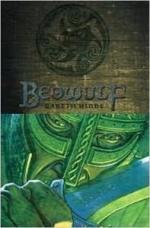80 That
some man or other had discovered the gold,
The
famous folk-treasure. Not fain did the hoard-ward
Wait
until evening; then the ward of the barrow
Was
angry in spirit, the loathed one wished to
Pay
for the dear-valued drink-cup with fire.
85 Then
the day was done as the dragon would have it,
He
no longer would wait on the wall, but departed
{The dragon is infuriated.}
Fire-impelled,
flaming. Fearful the start was
To
earls in the land, as it early thereafter
To
their giver-of-gold was grievously ended.
[1] For ‘long-gestreona,’
B. suggests ‘laengestreona,’ and renders,
Of fleeting treasures.
S. accepts H.’s ‘long-gestreona,’
but
renders, The treasure long
in accumulating.
[2] For ‘hard-fyrdne’ (2246), B. first suggested ‘hard-fyndne,’ rendering: A heap of treasures ... so great that its equal would be hard to find. The same scholar suggests later ‘hord-wynne dael’ = A deal of treasure-joy.
[3] Some read ‘fec-word’ (2247), and render: Banning words uttered.
[4] An earlier reading of
H.’s gave the following meaning to this
passage: He is said
to inhabit a mound under the earth, where he,
etc. The translation in
the text is more authentic.
[5] The repetition of ‘hord’
in this passage has led some scholars to
suggest new readings to avoid
the second ‘hord.’ This, however,
is not
under the main stress, and,
it seems to me, might easily be accepted.
[6] The reading of H.-So. is well defended in the notes to that volume. B. emends and renders: Nor was there any man in that desert who rejoiced in conflict, in battle-work. That is, the hoard-ward could not find any one who had disturbed his slumbers, for no warrior was there, t.B.’s emendation would give substantially the same translation.
[7] ‘Sinc-faet’
(2301): this word both here and in v. 2232, t.B.
renders ‘treasure.’
XXXIII.
BRAVE THOUGH AGED.—REMINISCENCES.
{The dragon spits fire.}
The
stranger began then to vomit forth fire,
To
burn the great manor; the blaze then glimmered
For
anguish to earlmen, not anything living
[79] Was the hateful air-goer willing to leave
there.
5
The war of the worm widely was noticed,
The
feud of the foeman afar and anear,
How
the enemy injured the earls of the Geatmen,
Harried
with hatred: back he hied to the treasure,
To
the well-hidden cavern ere the coming of daylight.
10 He had
circled with fire the folk of those regions,
With
brand and burning; in the barrow he trusted,
In
the wall and his war-might: the weening deceived
him.




